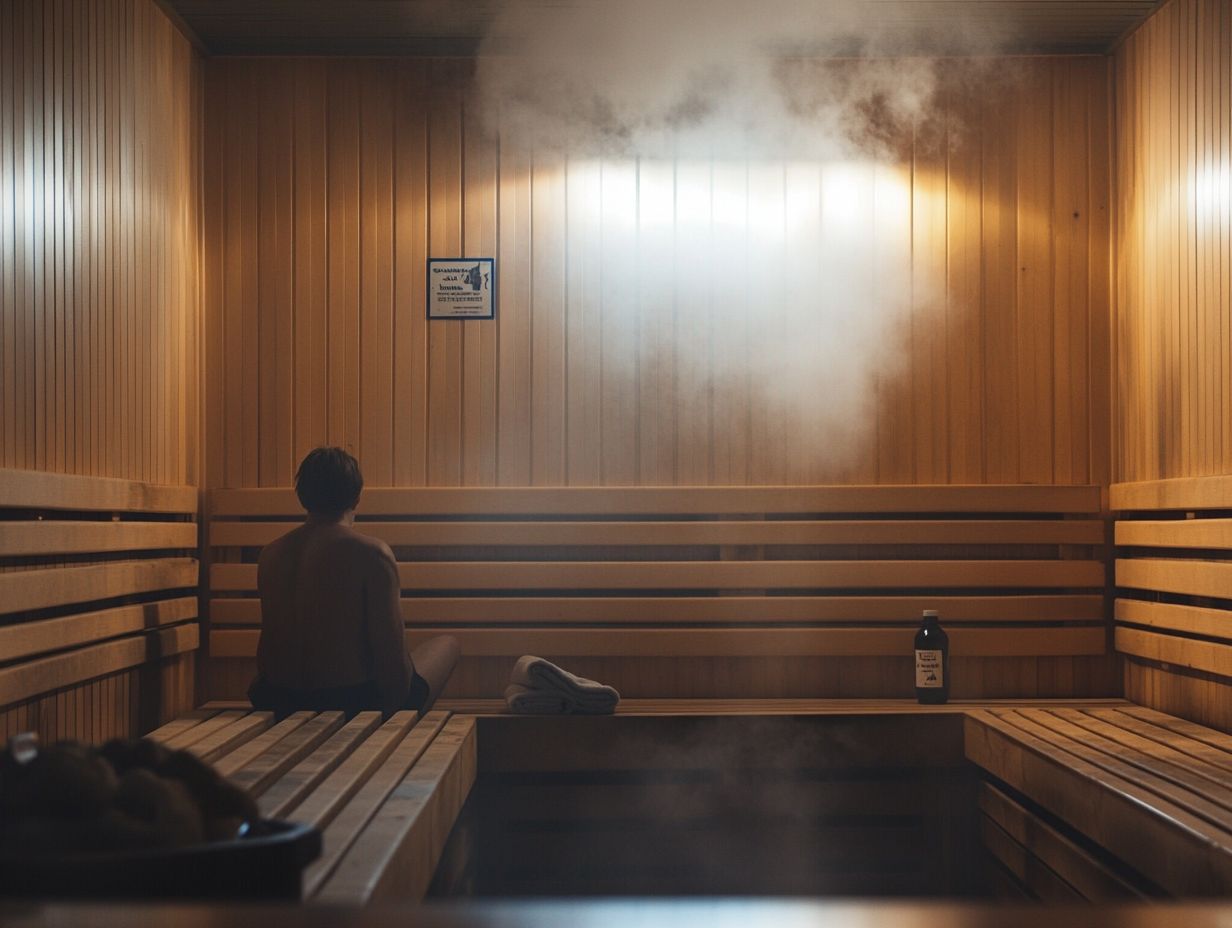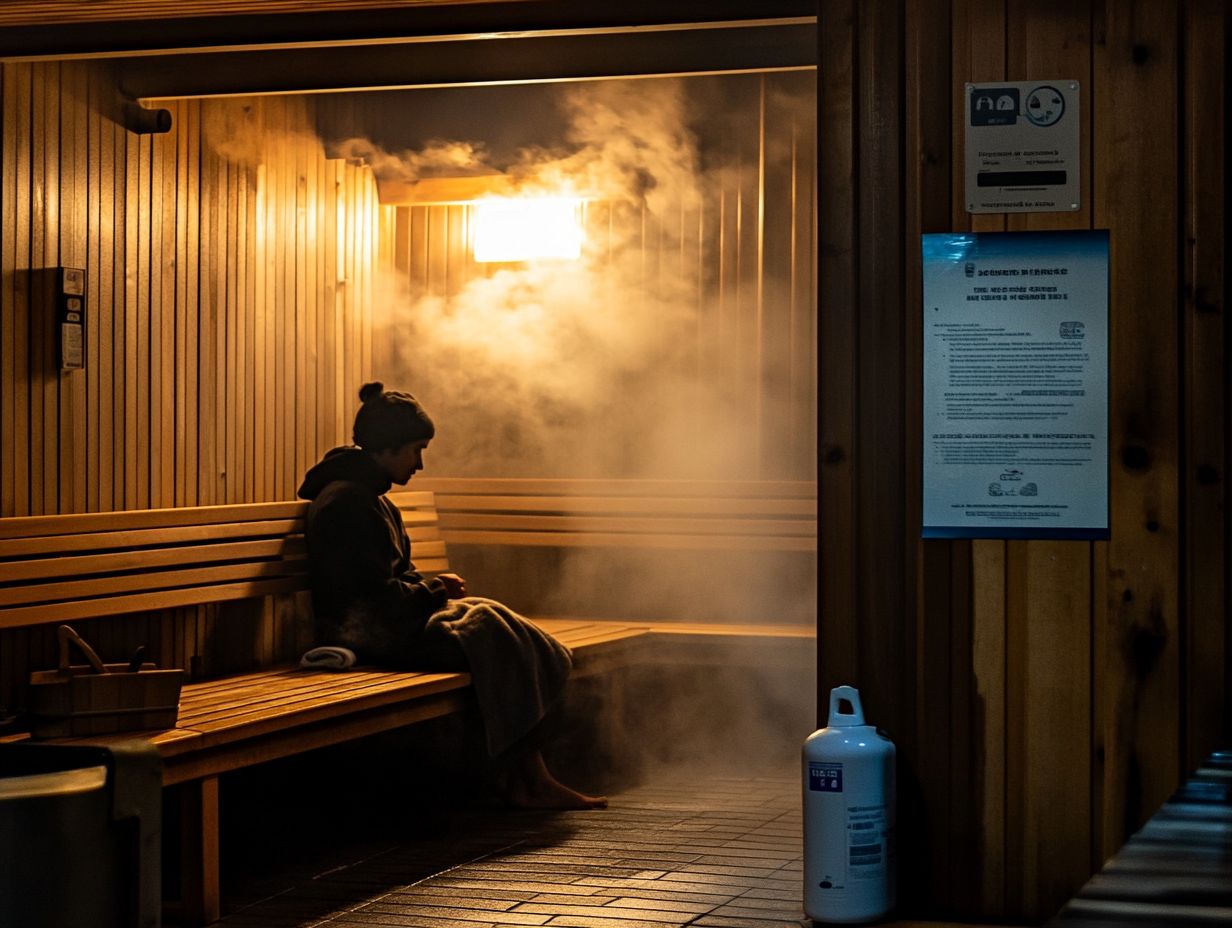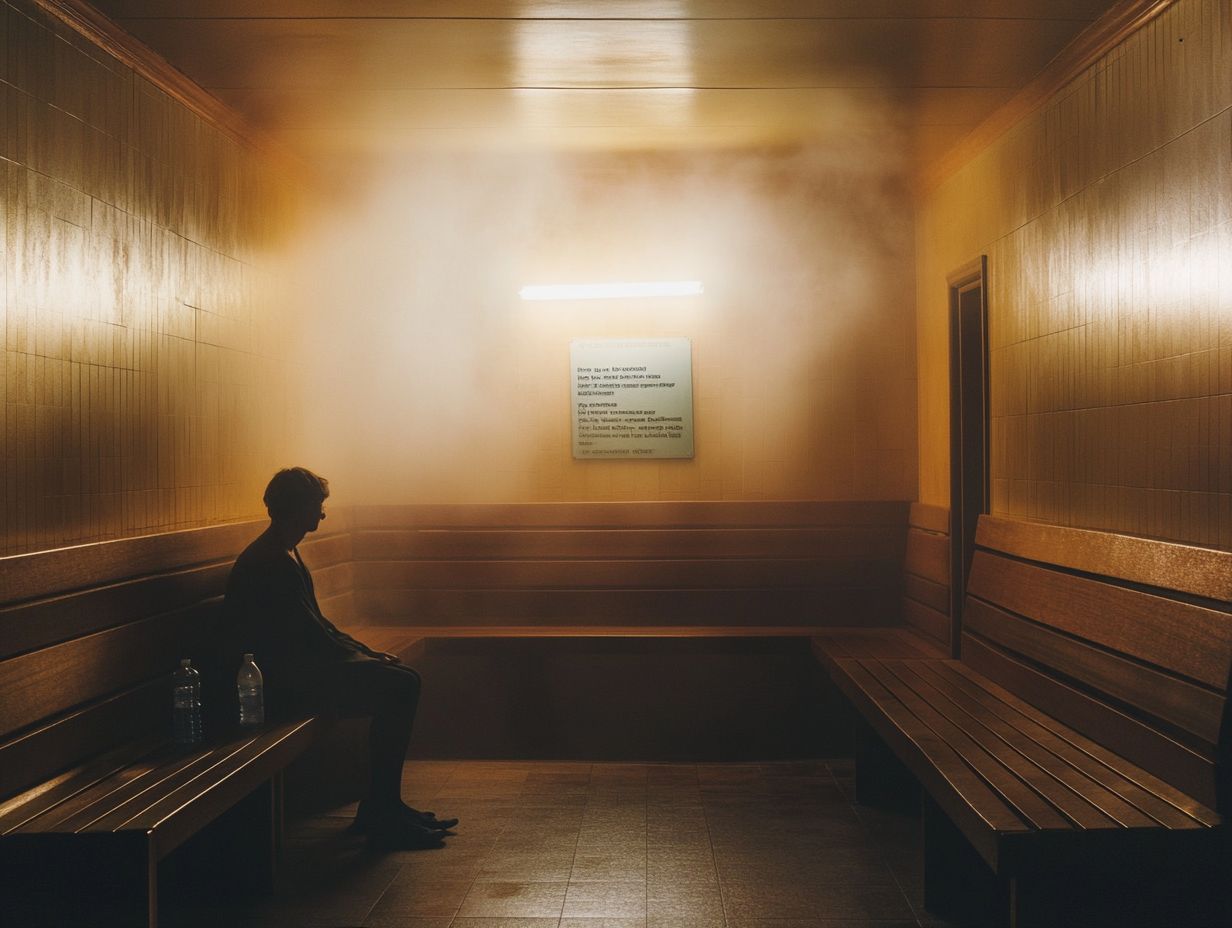Sauna Use During Illness: Safety Guidelines
Curious about saunas? This article explores their importance in wellness and the many benefits they offer for both physical and mental health.
If you’re feeling a bit off, it’s crucial to know when sauna use may not be safe. We’ll also cover important safety considerations during illness and suggest alternatives for detoxification and relaxation.
Uncover all the insights you need to make informed decisions about sauna usage, especially during times when you re not feeling your best.
Contents
- Key Takeaways:
- What is a Sauna?
- Benefits of Sauna Use
- Safety Considerations for Sauna Use During Illness
- Alternatives to Sauna Use During Illness
- Final Recommendations
- Your Burning Questions About Sauna Use Answered!
- Can I use a sauna while I am sick?
- What are the risks of using a sauna during an illness?
- Can sauna use help me recover from a cold or flu, or provide any health benefits?
- Are there any types of illnesses that are safe to use a sauna with?
- What precautions should I take if I do decide to use a sauna while sick?
- When is it safe to use a sauna again after being sick?
Key Takeaways:

- Sauna use can provide many physical and mental health benefits, but it is important to consider safety guidelines during illness.
- If you’re feeling feverish or unwell, it’s best to skip the sauna and choose a safer way to relax.
- If sauna use isn’t possible during illness, consider alternatives like hot baths and steam inhalation for detoxification and relaxation.
What is a Sauna?
A sauna is a cozy retreat designed for immersive heat sessions, deeply rooted in Finnish culture. Here, you can indulge in intense warmth and humidity, allowing yourself to unwind and rejuvenate.
The primary objective of a sauna is to cultivate a calming environment that enhances relaxation, facilitates detoxification, and boosts overall wellness through various heat treatments, like traditional steam and infrared saunas.
In Finland, saunas are not merely a luxury; they are woven into the fabric of social and health practices, offering a sanctuary for physical renewal and mental clarity.
Benefits of Sauna Use
Using a sauna presents a wealth of health benefits, from enhanced relaxation and muscle recovery to notable cardiovascular improvements. You’ll find that it can help lower blood pressure and reduce the risks associated with chronic diseases, such as cardiovascular issues and brain-related issues.
Numerous studies have shown that regular sauna sessions can boost lung function, facilitate detoxification, and promote overall wellness. For anyone pursuing a health-conscious lifestyle, incorporating saunas can be an invaluable choice.
Physical and Mental Health Benefits
The benefits of sauna use are truly remarkable. Whether you opt for an infrared sauna or a traditional one, both offer effective relief for muscle pain and promote relaxation essential for your mental well-being.
Research suggests that these calming environments can significantly reduce muscle soreness after exercise, aiding recovery by boosting blood circulation. The heat exposure prompts sweating, which helps flush out toxins from your body, alleviating conditions such as arthritis and fibromyalgia.
Regular sauna sessions can enhance your mental clarity and reduce stress. Studies indicate that individuals who indulge in sauna therapy experience lower anxiety levels and an overall improved mood. This uplifting effect is largely due to the release of endorphins during your time in the sauna, providing a rejuvenating experience that benefits both body and mind.
Safety Considerations for Sauna Use During Illness

While indulging in sauna use offers numerous health benefits, it s essential to remain mindful of certain safety considerations, particularly when you re under the weather. Hazards such as dehydration and overheating, which can lead to heatstroke, can present serious risks, especially for individuals with pre-existing medical conditions, including children and pregnant women.
Recognizing when to steer clear of the sauna is vital to avoid complications like heart attacks and other adverse health effects, especially for those with heart disease or pulmonary disease. Prioritizing your well-being ensures that you can fully enjoy the therapeutic advantages that saunas have to offer.
Ready to rejuvenate your body and mind? Dive into the soothing world of saunas today!
When to Avoid Sauna Use
There are certain situations where you should steer clear of sauna use, especially if you have specific medical conditions or are dealing with acute illness. This is essential to prevent complications, such as heart attacks or exacerbation of conditions like asthma. It s wise to consult healthcare professionals, such as those from Johns Hopkins Medicine, to ensure your sauna practices are both safe and effective.
For instance, if you have heart disease, the elevated temperatures in a sauna can place undue strain on your cardiovascular system, potentially worsening your condition. Likewise, if you struggle with respiratory issues like asthma or chronic obstructive pulmonary disease (COPD), the heat may hinder your breathing, increasing the risk of breathing problems. To ensure a safe experience, it’s important to understand sauna safety and the role of technology.
If you are prone to dehydration, whether from vigorous exercise or other health concerns, it’s best to avoid the sauna, as it can make dehydration and heat exhaustion worse. Being aware of these medical limitations and understanding sauna safety policies is essential for enjoying a safe and pleasant sauna experience.
Precautions to Take
Taking the right precautions during your sauna sessions is key for enhancing your experience while minimizing risks. Staying hydrated before and after your time in the heat and limiting your duration can significantly reduce any health risks.
Drink plenty of water before you step into the sauna. Proper hydration is key to maintaining the right amount of minerals in your body and supporting your overall well-being. Experts suggest having at least a glass of water before you enter.
Setting personal time limits is important aim for around 15 to 20 minutes per session to avoid overheating and potential heat exhaustion. Pay close attention to any signs of discomfort or fatigue; recognizing these cues is vital in deciding when it s time to exit.
Being aware of your health status, particularly with conditions such as heart disease or respiratory issues, is fundamental for ensuring a safe and enjoyable sauna experience.
Alternatives to Sauna Use During Illness
You have several effective alternatives to sauna use during illness, especially if you’re dealing with respiratory infections such as pneumonia or chronic bronchitis, where traditional sauna heat might not be the best choice.
Consider methods like:
- steam inhalation
- gentle exercise
- various relaxation techniques
Try these methods to feel better without the heat! These approaches can offer similar detoxification and relaxation benefits, minus the risks that come with sauna exposure.
Other Methods for Detoxification and Relaxation

Besides your sauna sessions, there s a wealth of detoxification and relaxation techniques available, especially if you re grappling with respiratory infections where heat therapy might not be your best option. Practices like yoga, meditation, and enjoying herbal teas, especially those that boost your immune system like ginger and dandelion, can offer soothing effects and facilitate your detox process without the risks associated with sauna use.
These alternative methods not only encourage physical relaxation but also enhance your mental clarity and emotional balance. For instance, engaging in yoga can improve your flexibility while energizing your body s natural detoxification systems, making it a valuable addition to your wellness routine. Meditation, on the other hand, alleviates stress and deepens your self-awareness, nurturing a comprehensive sense of well-being. Herbal teas, such as ginger or dandelion, serve as excellent allies in boosting your immune system and aiding digestion.
When you compare these approaches to sauna use, you ll find they are often more accessible, providing similar relaxation benefits and detoxifying properties without the intense heat. This makes them suitable for nearly everyone, especially those who are sensitive to high temperatures.
Remember, taking care of your health is the best path to feeling great. Explore these options and enjoy a balanced routine!
Final Recommendations
While saunas offer a wealth of health benefits, it s crucial to put first your safety and consider any individual health needs to truly savor the relaxation and healing they provide.
Understanding how to use a sauna properly enhances its benefits, ranging from improved cardiovascular health and removing toxins to stress relief and a radiant skin tone. It’s vital for you to stay hydrated and limit your time in the heat, especially if you’re new to the experience or have pre-existing health concerns. For families, following sauna safety guidelines is crucial to ensure a safe and enjoyable experience.
By keeping these factors in mind, you can turn your sauna sessions into refreshing rituals that not only calm your mind but also support your physical well-being, promoting overall health and resilience against diseases. This approach makes sauna time both safe and helpful for your wellness routine.
Your Burning Questions About Sauna Use Answered!
Can I use a sauna while I am sick?
It is generally not recommended to use a sauna while you are sick. The high heat can put additional strain on your body and may worsen your symptoms. It is best to rest and allow your body to recover before using a sauna, particularly to prevent any exacerbation of conditions like asthma or fibromyalgia.
What are the risks of using a sauna during an illness?

Using a sauna while sick can increase your body’s temperature and put extra stress on your heart. It may also cause dehydration, which can lead to dizziness, headaches, and fatigue.
Can sauna use help me recover from a cold or flu, or provide any health benefits?
There is no scientific evidence to support the idea that sauna use can help with cold or flu symptoms. In fact, using a sauna while sick may worsen your symptoms and delay your recovery.
Are there any types of illnesses that are safe to use a sauna with?
If you have a mild cold or sinus congestion, it may be safe to use a sauna. However, it is best to consult with your doctor before using a sauna while sick to ensure it is safe for your specific condition.
What precautions should I take if I do decide to use a sauna while sick?
If you choose to use a sauna while sick, it is important to stay hydrated by drinking plenty of water before and after your sauna session. It is also recommended to limit your sauna use to no more than 10-15 minutes and to avoid using a sauna if you have a fever.
When is it safe to use a sauna again after being sick?
Once you have fully recovered from your illness and have no more symptoms, it is generally safe to use a sauna again. However, it is always best to listen to your body and wait until you feel completely well before resuming sauna use.






